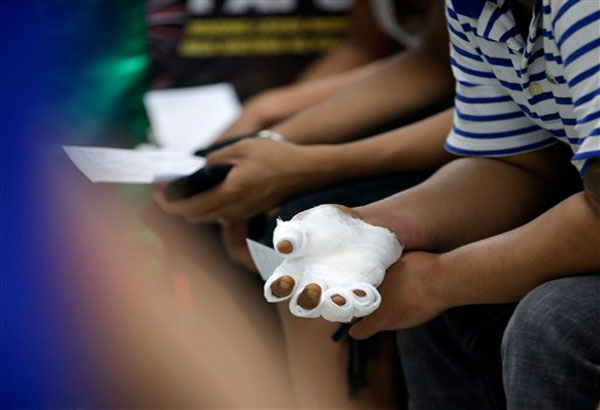Publishers’ exclusion in libel suits pushed
December 29, 2002 | 12:00am
Publishers should not be included in a libel suit.
This was the contention made by lawyer and journalist Napoleon Rama at the "Roundtable Discussion on Press Freedom" held recently at the Integrated Bar of the Philippines (IBP) national office.
Rama, the main speaker in the forum, called attention to an insidious subversion of press freedom arising from a misreading of the libel law provision.
The forum was presided by IBP president Teofilo Pilando Jr.
Rama identified the practice of the state, through its fiscals, to automatically include the publisher of a newspaper as liable in a libel suit.
"The libel law in the Penal Code enumerates those to be held liable in a libel case. The publisher is not one of those enumerated. It’s (a) fundamental principle: when a law enumerates, it excludes everyone not named in the enumeration," Rama said.
He added that this principle is enshrined in the old maxim inclusio unius, exclusio alterius – the inclusion of one, exclusion of the other.
Penal provisions are strictly construed in favor of the accused.
In the open forum, when asked to cite jurisprudence to support his theory, Rama came up with an old Supreme Court decision.
In an en banc decision, the Supreme Court acquitted an executive of the Manila Daily Bulletin, overturning a conviction by the lower court. The rationale of the now-forgotten 1914 Supreme Court decision was that Carson Taylor, then manager of the Manila Daily Bulletin, was not among those enumerated as liable for libel.
The libel law enumerated only the editor, the author of the news item and the proprietor as liable or necessary defendants in a libel suit.
Rama pointed out that this is the same libel law provision, with slight alterations, that is found in the current Revised Penal Code. The libel provision under the current code includes in its enumeration the editor, the author and the business manager instead of the proprietor. The publisher is not in the list.
After the open forum, Pilando and IBP board member Emil Ong, who is the chairman of the IBP’s committee on legislation and research, agreed with Rama on the misinterpretation of the libel law at the expense of press freedom. Many publishers now facing trial and some who had been or are still in jail are victims of this misreading.
They saw an urgent need to correct a legal blunder and gross injustice.
Among the legal reforms suggested by IBP officers were representation with the Department of Justice for the immediate dropping of publishers from all libel cases now pending in court, apart from an amendment to the libel law or filing of a declaratory relief petition with the Supreme Court.
This was the contention made by lawyer and journalist Napoleon Rama at the "Roundtable Discussion on Press Freedom" held recently at the Integrated Bar of the Philippines (IBP) national office.
Rama, the main speaker in the forum, called attention to an insidious subversion of press freedom arising from a misreading of the libel law provision.
The forum was presided by IBP president Teofilo Pilando Jr.
Rama identified the practice of the state, through its fiscals, to automatically include the publisher of a newspaper as liable in a libel suit.
"The libel law in the Penal Code enumerates those to be held liable in a libel case. The publisher is not one of those enumerated. It’s (a) fundamental principle: when a law enumerates, it excludes everyone not named in the enumeration," Rama said.
He added that this principle is enshrined in the old maxim inclusio unius, exclusio alterius – the inclusion of one, exclusion of the other.
Penal provisions are strictly construed in favor of the accused.
In the open forum, when asked to cite jurisprudence to support his theory, Rama came up with an old Supreme Court decision.
In an en banc decision, the Supreme Court acquitted an executive of the Manila Daily Bulletin, overturning a conviction by the lower court. The rationale of the now-forgotten 1914 Supreme Court decision was that Carson Taylor, then manager of the Manila Daily Bulletin, was not among those enumerated as liable for libel.
The libel law enumerated only the editor, the author of the news item and the proprietor as liable or necessary defendants in a libel suit.
Rama pointed out that this is the same libel law provision, with slight alterations, that is found in the current Revised Penal Code. The libel provision under the current code includes in its enumeration the editor, the author and the business manager instead of the proprietor. The publisher is not in the list.
After the open forum, Pilando and IBP board member Emil Ong, who is the chairman of the IBP’s committee on legislation and research, agreed with Rama on the misinterpretation of the libel law at the expense of press freedom. Many publishers now facing trial and some who had been or are still in jail are victims of this misreading.
They saw an urgent need to correct a legal blunder and gross injustice.
Among the legal reforms suggested by IBP officers were representation with the Department of Justice for the immediate dropping of publishers from all libel cases now pending in court, apart from an amendment to the libel law or filing of a declaratory relief petition with the Supreme Court.
BrandSpace Articles
<
>
- Latest
- Trending
Trending
Latest
Trending
Latest
Recommended


























